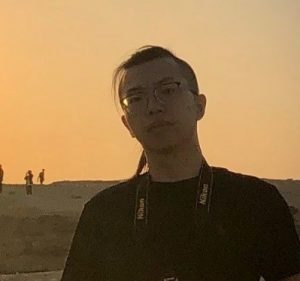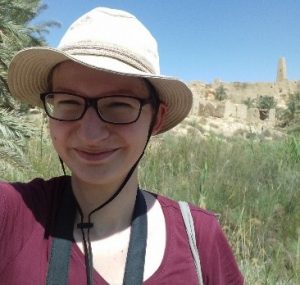
The UCLA Pourdavoud Center for the Study of the Iranian World is pleased to announce the awarding of the Morvarid Guiv Graduate Fellowship in Zoroastrian Studies. This fellowship was established at the Pourdavoud Center in 2018, thanks to a gift from the Trust of Morvarid Guiv. Named after the late Iranian philanthropist Morvarid Guiv, this fellowship endeavors to support graduate students working on all aspects of Zoroastrian studies at UCLA.
In its inaugural year, this fellowship was awarded to four successful graduate student applicants, whose works encompass different facets of Zoroastrian studies, that is, the Zoroastrian religion, its ancient history, languages, and scriptures. Below are brief biographies of each awardee. Each awardees’ complete application for the fellowship stipend follows.
Hong Yu Chen
 Hong Yu Chen is a Ph.D. student in the Department of Near Eastern Languages and Cultures with a focus in Iranian Studies and Egyptology. He was born in Fuzhou, Fujian, China. He grew up in a rural farming community in southern China until his family emigrated to the United States in 2004. He received his B.A. in History and Near Eastern Studies from The Johns Hopkins University, where he worked as a museum assistant for The Johns Hopkins Archaeological Museum and was trained as a philologist and a cultural historian of the medieval Near East. He is primarily interested in the social, religious, cultural, and economic interaction between Egypt and Persia during the First Persian Period of Egypt. He also engages with the modern, socially constructed hierarchies and relationships, including family constructs and gender constructs, and the differences there with ancient conceptions of similar hierarchies and relationships. He will be reading Avestan in the academic year 2020-2021.
Hong Yu Chen is a Ph.D. student in the Department of Near Eastern Languages and Cultures with a focus in Iranian Studies and Egyptology. He was born in Fuzhou, Fujian, China. He grew up in a rural farming community in southern China until his family emigrated to the United States in 2004. He received his B.A. in History and Near Eastern Studies from The Johns Hopkins University, where he worked as a museum assistant for The Johns Hopkins Archaeological Museum and was trained as a philologist and a cultural historian of the medieval Near East. He is primarily interested in the social, religious, cultural, and economic interaction between Egypt and Persia during the First Persian Period of Egypt. He also engages with the modern, socially constructed hierarchies and relationships, including family constructs and gender constructs, and the differences there with ancient conceptions of similar hierarchies and relationships. He will be reading Avestan in the academic year 2020-2021.
Elisabeth Koch
 Elisabeth Koch is an incoming first-year Ph.D. student in the Department of Near Eastern Languages and Cultures with concentrations in Iranian Studies and Egyptology. Previously, she attended the Freie Universität Berlin, where she received both her Bachelor’s degree in Ancient Studies and Master’s in Egyptology. While at the Freie Universität, she gathered experience as a Student Research Assistant for the project Database and Dictionary of Greek Loanwords in Coptic and excavated in Germany and Egypt. Elisabeth then worked as a Research Assistant with the German Archaeological Institute in Cairo and volunteered for the American Research Center in Egypt before joining UCLA. She intends to develop a dissertation topic that spans the intersection of Iranian Studies and Egyptology and focuses on Zoroastrian religious issues, specifically. She is planning to examine and understand Persian and Zoroastrian influences on the practice of religion in Persian period Egypt. She will be reading Avestan in the academic year 2020-2021.
Elisabeth Koch is an incoming first-year Ph.D. student in the Department of Near Eastern Languages and Cultures with concentrations in Iranian Studies and Egyptology. Previously, she attended the Freie Universität Berlin, where she received both her Bachelor’s degree in Ancient Studies and Master’s in Egyptology. While at the Freie Universität, she gathered experience as a Student Research Assistant for the project Database and Dictionary of Greek Loanwords in Coptic and excavated in Germany and Egypt. Elisabeth then worked as a Research Assistant with the German Archaeological Institute in Cairo and volunteered for the American Research Center in Egypt before joining UCLA. She intends to develop a dissertation topic that spans the intersection of Iranian Studies and Egyptology and focuses on Zoroastrian religious issues, specifically. She is planning to examine and understand Persian and Zoroastrian influences on the practice of religion in Persian period Egypt. She will be reading Avestan in the academic year 2020-2021.
Emma Petersen
 Emma Petersen is a Ph.D. student in the Department of Near Eastern Languages and Cultures. Her research interests include Achaemenid art, architecture, and archaeology; interactions between Iran and the eastern Mediterranean during the Achaemenid period; administration, ritual, and policy in Achaemenid and Seleukid Babylon; and the ritual environment of the Hellenistic East. She received a B.A. with a double major in Art History and Classical and Near Eastern Studies and minors in Latin, Classical Archaeology, and Anthropology at the University of Minnesota. During her time at the University of Minnesota, she participated in an archaeological excavation at the site of Gabii, Italy (in Latium), under the direction of Nicola Terrenato of the University of Michigan. She also received an Undergraduate Research Opportunities Program (UROP) grant to study the uninscribed seals of the Persepolis Fortification Archive (PFA) tablets at the Oriental Institute of the University of Chicago. As a member of the Persepolis Fortification Archive Project, she was able to study a group of seals that deviate from the normative categories of composition, style, and iconography as defined in earlier scholarship. Her most recent research endeavors have been focused on the depictions of the divine and numinous in Achaemenid monumental and glyptic art in the context of Zoroastrian religion. She will be reading Avestan in the academic year 2020-2021.
Emma Petersen is a Ph.D. student in the Department of Near Eastern Languages and Cultures. Her research interests include Achaemenid art, architecture, and archaeology; interactions between Iran and the eastern Mediterranean during the Achaemenid period; administration, ritual, and policy in Achaemenid and Seleukid Babylon; and the ritual environment of the Hellenistic East. She received a B.A. with a double major in Art History and Classical and Near Eastern Studies and minors in Latin, Classical Archaeology, and Anthropology at the University of Minnesota. During her time at the University of Minnesota, she participated in an archaeological excavation at the site of Gabii, Italy (in Latium), under the direction of Nicola Terrenato of the University of Michigan. She also received an Undergraduate Research Opportunities Program (UROP) grant to study the uninscribed seals of the Persepolis Fortification Archive (PFA) tablets at the Oriental Institute of the University of Chicago. As a member of the Persepolis Fortification Archive Project, she was able to study a group of seals that deviate from the normative categories of composition, style, and iconography as defined in earlier scholarship. Her most recent research endeavors have been focused on the depictions of the divine and numinous in Achaemenid monumental and glyptic art in the context of Zoroastrian religion. She will be reading Avestan in the academic year 2020-2021.
Alex Roy
 Alex Roy is a third-year Ph.D. student in the Department of Indo-European Studies. Originally from Massachusetts, he received a B.A. in Sanskrit from Brown University in 2017, where he studied Vedic, Epic, and, Classical works as well as Latin, Greek, and Prakrit languages. His graduate work focuses on the history and development of Indo-Iranian languages and literature, with particular attention to the grammar and vocabulary, as well as cultural and natural worlds witnessed in archaic texts. His research focuses on the Indo-Iranian language family and of the traditions of its speakers, with particular attention to the family’s earliest representatives. Among his chief aims is a deeper understanding of the ancestral language and culture (“Proto-Indo-Iranian”) as is accessible through extant material, as well as an account of the divergences that gave rise to the characteristic features of Zoroastrian and Vedic expression, ideology, and practice. During the upcoming academic year, he plans to take a doctoral qualifying examination in the Old Iranian languages (Old Avestan, Young[er] Avestan, and Old Persian), administered through the Program in Indo-European Studies, with the aim of developing proficiency in the study of their corpora. He will continue reading Avestan in the academic year 2020-2021.
Alex Roy is a third-year Ph.D. student in the Department of Indo-European Studies. Originally from Massachusetts, he received a B.A. in Sanskrit from Brown University in 2017, where he studied Vedic, Epic, and, Classical works as well as Latin, Greek, and Prakrit languages. His graduate work focuses on the history and development of Indo-Iranian languages and literature, with particular attention to the grammar and vocabulary, as well as cultural and natural worlds witnessed in archaic texts. His research focuses on the Indo-Iranian language family and of the traditions of its speakers, with particular attention to the family’s earliest representatives. Among his chief aims is a deeper understanding of the ancestral language and culture (“Proto-Indo-Iranian”) as is accessible through extant material, as well as an account of the divergences that gave rise to the characteristic features of Zoroastrian and Vedic expression, ideology, and practice. During the upcoming academic year, he plans to take a doctoral qualifying examination in the Old Iranian languages (Old Avestan, Young[er] Avestan, and Old Persian), administered through the Program in Indo-European Studies, with the aim of developing proficiency in the study of their corpora. He will continue reading Avestan in the academic year 2020-2021.

